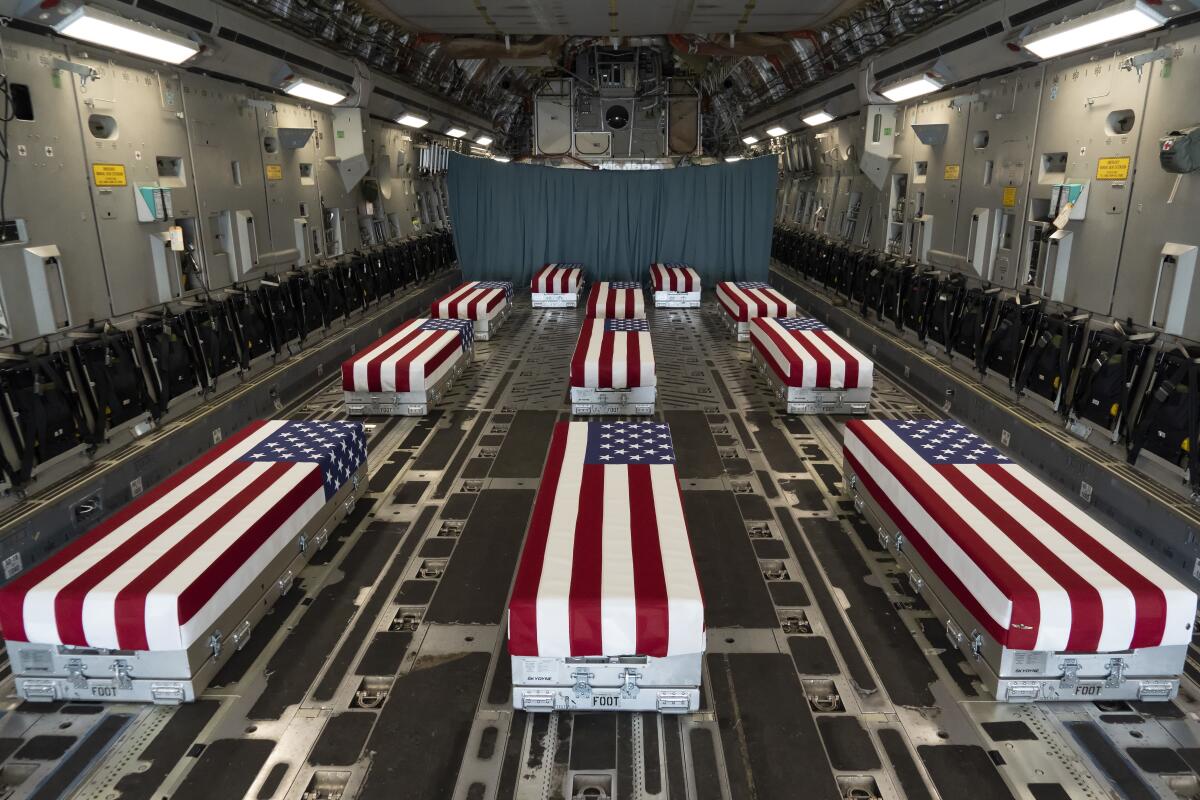Op-Ed: Did the American troops who were killed in Afghanistan die in vain?

More than 4,000 Americans were killed in Afghanistan.
No one wants to believe their loved one died in vain. But when it happens, it is the duty of the living to make sure it does not happen again.
A week before I deployed to Iraq in 2003, I said to my wife and daughter, “I’ll be protecting you guys, preserving our freedoms, killing terrorists before they can come here.”
But I never protected anything within 5,000 miles of American shores. And despite what President George W. Bush claimed, the insurgents trying to kill me did not hate America for its freedoms. They just wanted us out of their country. Few, if any of them had plans to come to the United States to kill people.
Eighteen years later, I deal daily with the fallout of U.S. military efforts to defend America’s freedoms from people who were not trying to take them away. As a Superior Court judge, I preside over the Riverside County Veterans Treatment Court, where I supervise the recovery of veterans who have committed crimes because of mental health conditions related to war. Some have been horribly damaged, mentally and physically. Many have lost everything: spouses, children, family, friends, self-worth, health and freedom. Most suffer from post-traumatic stress disorder or brain injuries caused by bombs.
Like me, these veterans believed it was in our national interest to crush the Taliban and conduct counterterrorism operations. We believed that Iraq and Afghanistan were holding tanks for terrorists waiting for passage to America.
But we quit believing. We got tired of hearing people lie to us.
Gen. Mark A. Milley, Chairman of the Joint Chiefs of Staff, said in December 2019 that he could not look at himself in the mirror if he believed the U.S. troops killed in Afghanistan had died in vain. Milley said the sacrifices of those killed and wounded had helped prevent other attacks on American soil like the ones on 9/11, and their service held the Taliban and other insurgents at bay.
Milley is one of several U.S. officials who predicted a rosy future for Afghanistan: “Right now, I would say that the conditions are set for winning this war,” he proclaimed in 2013. But the troops on the ground there were expressing extreme doubts about the competency of the Afghan forces that Milley was showing confidence in, at least publicly.
If preventing another 9/11 required engaging and destroying the Taliban, why did we hand Afghanistan back to them. Is the risk of attack less after America withdrew in a chaotic retreat that President Biden claims was an “extraordinary success”? Is the Taliban less dangerous now that billions of dollars of American military equipment is in their hands?
You would think our government leaders would have learned from the 1975 collapse of South Vietnam. What purpose did more than 58,000 Americans die for in Vietnam?
It is painful to believe that a loved one’s death was unnecessary and was not part of a greater good.
The Americans killed in Afghanistan were warriors, willing to die if necessary. In return, they expected competence in their leaders. They got ineptitude. According to Douglas Lute, former deputy national security advisor for Iraq and Afghanistan, “We were devoid of a fundamental understanding of Afghanistan — we didn’t know what we were doing.”
And, our warriors expected to be told the truth. They got lies. If our military and civilian leadership did learn something from Vietnam, it was how to deceive Americans. The “Afghanistan Papers,” obtained by the Washington Post, document “explicit and sustained efforts by the U.S. government to deliberately mislead the public …. [I]t was common at military headquarters in Kabul — and at the White House — to distort statistics to make it appear the United States was winning the war when that was not the case.”
I believe our service men and women are “among the finest people of their generation,” to quote Evan Wright, author of “Generation Kill.” But our wanting to believe they died in the pursuit of a noble cause cannot excuse the incompetence and deceit of the leaders who sent them there. These honored dead died in an unnecessary 20-year war that failed.
The first part of addressing any failing is in admitting it exists. Our task as the living is to highly resolve that it does not happen again.
Gretchen Catherwood’s son, 19-year-old Alec, was killed in Afghanistan fighting the Taliban in 2010.
M.E. Johnson is a California Superior Court judge, a retired U.S. Army colonel and an Iraq War veteran. For eight years, he has presided over the Riverside County Veterans Treatment Court.
More to Read
A cure for the common opinion
Get thought-provoking perspectives with our weekly newsletter.
You may occasionally receive promotional content from the Los Angeles Times.











